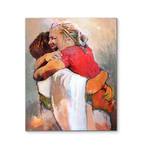I would like you to imagine in your minds eye the following four
scenarios as they relate to faith and trust. If you recall the tv. show
'Wipeout' try to imagine one of those obstacle courses. It's a course
that if you were to mess up on an obstacle there is a real consequence,
you fall, or get hurt, or land in mud, slime, water, whatever it is. So
each obstacle has a certain amount of anxiety and fear involved and
there is risk.
You have been invited to this obstacle course on Friends Night. The
rules are simple, you run the course, while your friend talks you
through each obstacle. So you chose your best friend for the job. The
one who has never deceived you, doesn't like to pull pranks on you, one
that you trust implicitly.
Scenario 1: It is a bright sunny day, you can see the obstacle course
clearly in front of you, and already you see you can do this level
easily. Your friend is visibly nearby on a walkway so they can see
perfectly. You can hear their voice well. The course begins. You see
in front of you a log across your path and you friend says 'Take two
steps forward and then jump over the log." You see the obstacle, agree
with your friend, and execute their orders perfectly. The next obstacle
is a rotating arm at your eye level, your friend says "duck and crawl
forward 20 paces." You see the obstacle, agree that is good advice, and
perform perfectly. Doing things in this way makes the course easy and
you pass it with flying colors.
In this scenario, you built trust with your friend. You could see what
needed to be done and agreed with their instructions. While you didn't
have to call much on FAITH, what you did do was build TRUST. Trust as I
am defining it, is how much you believe what someone is saying is true.
FAITH as I'm defining it here, is putting action behind that trust and
actually doing something. You trusted the instructions to leap over the
log were correct and when you leapt over it, you applied FAITH.
In this scenario, would it be hard to trust your friend? The major
difficulty might instead be to ignore your friend's instructions and do
the course on your own. Maybe your friend would be impressed at how 'in
sync' you were because you did what they were about to tell you do
before they said it? Maybe you didn't need your friend at all? But by
doing it the way you did, you came through the course, and your
relationship grew stronger.
Scenario 2: It is the same bright and sunny day. Your friend is visible
and clearly heard, only this time they are on a raised platform and have
a different vantage point than you. The obstacle course is easily
viewable and the two of you work like a team just like you did before,
going through several obstacles until you come to a new one. This one
has a large wall in front of you with painful looking spikes on it. It
also has a clear path around it. It is obvious to you that you should
take the path around the wall, and yet your friend's instructions are
"Run hard at the wall and smash into it." The instructions contradict
what your gut tells you to do.
In this scenario, your trust in your friend is challenged. You have to
decide if you trust them more than yourself. What you do next determines
where you're placing your FAITH. You decide, they have a better view
and so you trust them, and in faith, charge at the wall. As you collide
with the wall, there is a small amount of pain but not as bad as you
anticipated, and the wall collapses, you land on top of it, spikes
having receded, and move forward through the course to completion. At
the end you ask someone else who completed the course, 'what did you do
at the wall' and they tell you 'I went around it of course, but as I
did, this large boxing glove hand came out and hit me right in the gut.
Took the wind out of me. I nearly fell!" You both arrived at the same
place, but your way, though you incurred some pain, was less painful.
(you could really paint many scenarios here for what happened on the
other path, they could have been completely unharmed, or taken to a
different location, or fallen into the water, it doesn't matter what
happened on that other path.)
In this scenario, your TRUST was tested, and your FAITH prevailed. But
the temptation there was to go your own way and ignore the advice of
your friend. But because you didn't, you were rewarded in finding that
your friend's advice was a better way, even though it did cost you some
pain, it didn't cost you as much as your way would have. By behaving in
that way your trust and faith in your friend has increased and your
relationship grew stronger. You're more likely to trust them on the next
level when they tell you to do things that don't make sense.
Scenario 3: A thick fog sets in. You're standing at the beginning of
the next level of the course, and your friend is no longer visible but
completely audible. You can hear their voice very clearly, but you can
not see them, nor the obstacle in front of you. You begin, but this
time, are a bit slower and more cautious because you're robbed of your
ability to see ahead of you. But because you've gone through the first
two levels with your friend, you trust them. They say duck, you duck,
they say jump you jump. Each time you do, things go well. But there is
a constant anxiety because you can't see. At one point they say "this
next part will be tricky, you're doing great, but there are several
obstacles in a row here, we're going to take them one by one."
Together, you listen and follow and get through it to the end!!! YeS!
In this scenario, you may have been nervous because you couldn't see
ahead of you. Maybe you were tempted to never step onto the course at
all. Maybe you were half way through the course and when you got to the
point of 'this next part will be tricky' you wanted to hear ALL the
instructions at once so you could plan and react. As your friend only
gave you one instruction at a time you may have wanted to shout out
'tell me the next 10 steps before I proceed!' (It has been my life
experience that I rarely get more than the instructions for the next
step, though I'd love to have the entire course laid out for me that
doesn't seem to be how this teamwork works. ) But in the end you got
through, and now you have a deep faith based in 3 successful levels of
this course.
Scenario 4: The thick fog remains, you can not see the course, and now
you can barely hear your friend. Fear sets in. You know this level is
likely the hardest and you can only faintly hear your friend's voice in
the distance. What happened? Why this change? Is there a CB radio? Did
you wander to the wrong location? Why can't you hear them?! Never the
less, the bell rings and it's time to begin. You can barely make out
your friend's words. Did they say 'duck' or 'jump?' You're uncertain.
The more you move, the more noise is made and the less you can hear
them. What is going on? How can you do this? You can't see on your own,
and now, you can't hardly hear them? All the work you've put into
building your faith and trust with your friend, seems pointless now, and
you have no idea how to succeed at this level.
What's the first thing you need to do? Do you step out on your own and
grope around and feel and hope? Do you try to repair communication with
your friend, figure out why you can't hear them? Do you cup your ears
and try to listen harder? By now you have learned that you can't
really succeed without either seeing the course yourself or hearing your
friend. So which problem do you try to rectify first? Or do you even
try to fix either and just begin walking forward? This level seems like
a cruel trick and yet, so many times in our lives we come to this scenario.
These scenarios are very likely to be obvious to you at this point. The
obstacle course is my life. My friend is Jesus Christ, the all-knowing,
all-loving, humble savior of my soul. I've found myself in all these scenarios
at one point or another in life, and I've come to the decision that my
favorite scenario, is scenario 3. It seems that as long as I have a
close relationship with my Lord, I feel at ease doing the things He
instructs me to do while at the same time, I don't know 'what comes next'. This is scary and exhilarating but also forces me to rely on Christ and keep my ear tuned to Him. None of these scenarios are easy, the obstacle course without a friend is hard enough and requires athleticism and
confidence to even attempt. With a friend, with the Lord, it may not be
any easier, but you have something outside of yourself, with your best
interest at heart, helping you. You're not alone through it, and there
is a way to be victorious. There is someone at the end to celebrate
with. There is hope. Even in Scenario 4, it is not hopeless because you
can hear that voice, all you have to do is focus on it, and by doing so,
it gradually becomes louder. There is hope, there is help, you're not
alone.
There is a 5th scenario. One that I don't like to contemplate much. It
is identical to Scenario 4, thick fog, inability to see very obstacle,
but in this scenario there is no voice of the friend. You have no
friend that you trust that much, you haven't built that relationship, no
one seems to want to be your friend, or you have a hard time making
friends, or a hard time trusting people. There are a lot of people who
have succeeded and failed at live in this scenario. Sure you can get
through the obstacle course alone who needs a friend anyway? But when
you get through it at the end, there is no one to hug, to jump up and
down with, no one as excited about your success as you, no one invested
in your win. No one to celebrate with. In those darkest hours there is
no hope. As you come to the end of yourself, there is nothing external
you have built trust in that you can rely on. The dark times have no
light.
My friend is Jesus Christ. I have spent my life investing in trusting
Him and having faith in Him and He has never let me down. It took a
while to find Him, to find the real Him. Lots of people want to tell
you about Him, but there's really only one way to truly get to know Him
and that's by reading the Gospels of the Bible yourself, and
understanding them. Sometimes they can be hard to understand, so I find
it's best to find a translation where the words make sense, and then if
you get stuck on something, to really seek out truthful answers.
There's a lot of charlatans out there who want to tell you about Jesus.
It's best to just seek Him out on your own through the Bible, so you
know you won't be steered wrong. I started in the Gospel according to John.
I met Jesus Christ when I was young, and at first He seemed like a bunch
of rules I had to follow, but as I went through life, and ran into those
difference Scenarios I listed, I learned to trust Him, and to love Him.
Oh man how I love Him. The phrase people use these days is 'He's my
person.' He gets me, my thoughts and dreams, He loves me in a personal
way. He is my best friend of all time. I know that's odd to say seeing
as how I've never seen Him face to face, but I am super excited about
the day that I get to. I want to rush through the obstacle course we
call life, and get there. That's what's waiting for me at the end of
it. Not riches or prizes like the t.v. show, but getting to see my best
friend, face to face, and hopefully give Him a big long bearhug. Like
one of those awkward hugs where other people are looking on going 'okay
man, that's long enough... wow that's a long hug! Enough, He's a busy
guy! Let Him go.' And then Jesus says 'nah, let him be, I'm loving this
hug! I've waited a long time for this one.'
note:
This really isn't meant as way to define FAITH vs TRUST. Some see FAITH
as being TRUST in spiritual things, whereas TRUST is believing in
scientific or empirical evidence. To me the two words can be used
interchangeably in this example, save for the fact that there is an
action element to FAITH whereas TRUST doesn't always need to be acted
on, thought often is. Also I hate when people tell me 'how to feel' in
their writing. I am guilty of doing that in this, and I chose to do so
because of brevity, but also, this came to my mind as more of a sermon
than a blog entry, so it's meant to be spoken so you can hear the
emotion coming from me.













